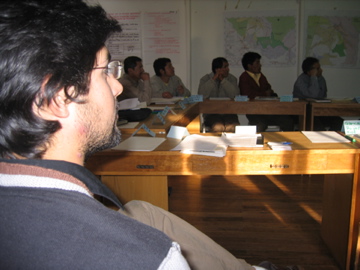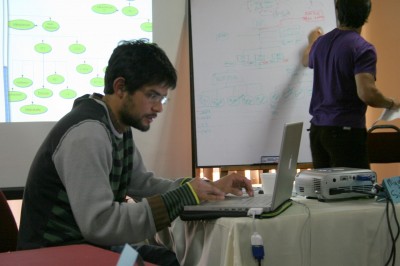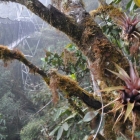Pablo in Peru
The seasonal smoke of the land lays a thick blanket over the nascent grounds of the Peruvian Amazon. The air is thick and I’m sweating from just sitting below the light bulb that congregates a community of moths, flies and mosquitoes. My current home is Pillcopata, a small town with no paved roads and the last settlement with electricity on the way to Manu National Park. I’ve spent all day walking around the surrounding Sacha Inchi chakras (fields) with two técnicos (agricultural extension agents) and a couple of university graduate students working in the area with organic pesticides. The Sacha Inchi chakras are a micro-enterprise initiative that ACCA, One Sky’s local partner organization, begun a couple of years ago as a first step to collaborate with communities in the area. ACCA, or the Asociación para la Conservación de la Cuenca Amazónica, is a Peruvian organization working mainly on conservation efforts and scientific research in the area. Working with some of the most marginal communities of the Peruvian Amazon has elucidated the fact that conservation efforts have to widen in scope and include local realities if they are to be sustainable. The Sacha Inchi micro-enterprise initiative is a social experiment that is attempting to facilitate a diversification in the local economy that benefits not only economically but also socially (collaborative) and environmentally (organic alternative to banned pesticides). Local communities are primarily dependent on agriculture. Subsistence and coca plantations are a common way of life but so are the traditional slash-and-burn practices employed, methods that encroach into the rainforest. Every year the Amazon basin looses millions of hectares to timber exploitation, agriculture, road building and human settlement. The local people’s livelihood is intrinsically connected to their environment but their dire dependence forces an escape from any reverence to the sustainable use if their resources. Micro-enterprise development projects that provide economic alternatives to timber exploitation and encroachment, rapid soil depletion and heavy chemical use, have become an important tool for ACCA to establish community rapport and still meet their organizational mandate. These provide an opportunity to foster long-term connections with people that, as I witness, appears to be a magical crash between worlds in hope that they will find a dialectic unity. To understand each other, however, their collaboration will have to go beyond technical advice and delve deeper into a horizontal relationship that involves understanding different cosmovisions and levels of consciousness.

The interface between conservation and economic development was for me, up until now, only a conception ideated within a small informational elite; perhaps something I read in millennium development reports or heard being discussed abstractedly between walls plastered with academic jargon and air conditioned by the breath of policy or NGO meetings. Today I find that it also has beating hearts, arms and legs as well as minds of its own, a spirit within that escapes any traditional reductionism. Helping ACCA better identify this, I think, is one of One Sky’s most important role in their partnership. The use of integral theory wills not only help ACCA find its position in relation to their work on the ground but it will also help the organization grow from within. Capacity development workshops at all levels of the organization take the role of reframing a new organizational culture that will take three long years of active participatory processes and an ocean of will. My role is transient, as anything, but too brief for my taste. The strategic role I take within ACCA, aside from collaborating with the técnicos in Sacha Inchi, is that of a participant observer in the Native Community of Queros, another Indigenous group that ACCA is beginning to work directly with in the Amazon basin. I will be spending the next five months between this community and Pillcopata (Sacha Inchi). In Queros my primary task is to become a temporary comunero, build trust and One Sky-presence until before next year’s intern takes over. Within this timeframe I have to do three main things. First, become familiar with the communities perception and conception of the conservation concession that they have applied for. Second, identify key figures in the community who could be major actors in facilitating the successful management of the conservation concession. Third, asses the viability and plan the visit of an international delegation to the community, educating about the work that ENGOs do in terms of conservation concessions and community economic development in the Peruvian Amazon. Today, I walk further into the Amazon.



Posted by: .(JavaScript must be enabled to view this email address) on 05/13 #